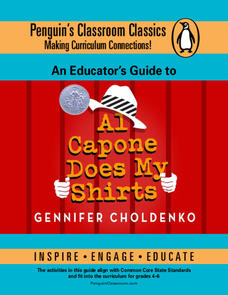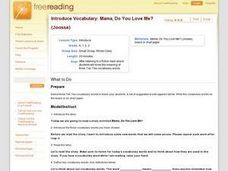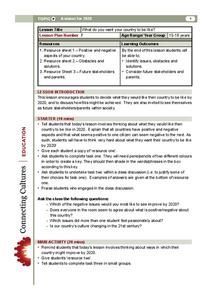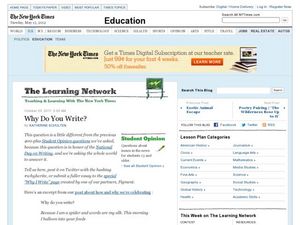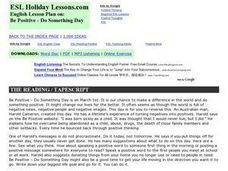Colorado State University
How Does the Earth Cool Itself Off?
Where does all the heat go when the sun goes down? An interesting lesson has learners explore this question by monitoring the infrared radiation emitted over time. They learn that hot spots cool more quickly that cooler spots.
Penguin Books
An Educator's Guide to Al Capone Does My Shirts
It's hard to imagine that life on Alcatraz could be dull. A series of intriguing lessons take readers through the novel Al Capone Does my Shirts. Pre-reading questions introduce the text and a range of suggestions, from comic strips to...
Curated OER
What Does Earth Day Mean? - Biology Teaching Thesis
Students possible sources of water pollution, and explain the effects that water pollution can have on the food on the food chain. They Name human and other animal (i.e. fish) illnesses that can be contracted from drinking polluted...
John F. Kennedy Presidential Library & Museum
Ask Not What Your Country Can Do for You
Ask not what the lesson here can do for you, but what you can do with the lesson. The answer is quite a lot! Young scholars revisit JFK's famous inaugural address with a focus on his plea for civic engagement. There's a...
Curated OER
Introduce Vocabulary: Mama, Do You Love Me?
Youngsters analyze tier two vocabulary words. Learners explore their comprehension of tier two vocabulary words found while reading Mama, Do You Love Me? and record their vocabulary using a word journal or discovery chart.
K12 Reader
"How Do I Love Thee?" Supporting Ideas
Show your class what poem the famous line "How do I love thee? Let me count the ways" comes from. Class members read Elizabeth Barrett Browning's poem and respond to one question with a short paragraph. The question asks learners to use...
University of the Desert
What Do You Want Your Country to be Like?
How would you like your country to be by 2020? What issues do you feel are most important, and how do those compare with your peers? Learners tackle questions regarding the evolving national and global culture of the twenty-first century...
EngageNY
How Do Dilations Map Segments?
Do you view proofs as an essential geometric skill? The resource builds on an understanding of dilations by proving the Dilation Theorem of Segments. Pupils learn to question and verify rather than make assumptions.
EngageNY
How Do 3D Printers Work?
If we stack up all the cross sections of a figure, does it create the figure? Pupils make the connection between the complete set of cross sections and the solid. They then view videos in order to see how 3D printers use Cavalerie's...
EngageNY
Why Do Banks Pay YOU to Provide Their Services?
How does a bank make money? That is the question at the based of a lesson that explores the methods banks use to calculate interest. Groups compare the linear simple interest pattern with the exponential compound interest pattern.
American Chemical Society
Does Temperature Affect Dissolving?
When making sweet tea, why do people dissolve the sugar in hot tea instead of cold tea? The class discusses the previous lab and builds upon it. Working in groups, they design an experiment to determine how temperature affects the...
Serendip
How Do Muscles Get the Energy They Need for Athletic Activity?
Every muscle movement requires energy, but where does that energy come from? Scholars answer this question and more as they complete a worksheet. By following the directions, completing research, and discussing it as a class, they begin...
Missouri Department of Elementary
How Does a Friend Act?
Two puppets showcase social skills while scholars decide whether their actions are positive or negative. Learners take turns with the puppets, acting out scenarios with a peer while the rest of the class decide if they're being a good...
iCivics
Why Do We Have a House and Senate, Anyway?
Why does the United States have a bicameral voting system? Through role playing as either advocates for or against a cell phone policy in school, your learners will organize, vote, compromise, and experience first-hand the benefits of a...
Champions for Change
How Many Cups Do I Need?
Does an apple a day really keep the doctor away? Find out by browsing through a variety of handouts and learning the recommended daily amounts of fruits and vegetables for good health. Learners will read and discuss how to visually...
Curated OER
Why Do You Write?
Ask your learners this question as a quickwrite: why do you write? This prompt can begin a unit on writing and open up a dialogue about the motivations writers have. Tap into your scholars' reasons for writing and make the activity more...
Curated OER
Do, Does, Did
In this English worksheet, students choose do/does/did to complete the sentence. Students are given questions that are incomplete.
Curated OER
Be Positive - Do Something Day
In this Be Positive - Do Something Day worksheet, students complete activities such as reading a passage, phrase matching, fill in the blanks, correct words, multiple choice, spelling, sequencing, scrambled sentences, writing questions,...
Curated OER
How Well Do You Know A Tale of Two Cities?
Are you working on a Charles Dickens unit? Ten multiple-choice questions from A Tale of Two Cities will do the job checking reading comprehension. Use this resource as a quick diagnostic tool after reading the novel as a class.
California Academy of Science
Where Do I Put My Trash?
Where does the trash go after you put it in the garbage can? The class discusses sustainability, recycling, compost, and landfills as they play as fun relay game. In teams, they race to be the fastest group to successfully sort...
PBS
Racial Equality: How Far Have We Come and How Far Do We Have To Go?
Is everyone treated fairly in America? The culminating fifth lesson from a series of five has pupils explore racial inequalities from the 1960s and decide whether or not society has changed over time. The lesson comes with a speech from...
K20 LEARN
Government Power: Do the Actions of Government Effect Me?
What does the government have to do with getting a driver's license? Including the calorie count for a meal on a restaurant menu? By discussing these kinds of questions and researching how concepts behind federal, state, and local...
Curated OER
What Do They Eat?
What does a monkey eat? How about a squirrel? Introduce your young scholars to different types of eaters in the animal kingdom with this cut-and-paste activity. Students assess 6 animals: a squirrel, a frog, a monkey, a seal, a dog, and...
Serendip
How Do Biological Organisms Use Energy?
When an organism eats, how does food become energy? Young biologists follow glucose through the process of cellular respiration to the creation of ADP using a discussion-based activity. The resource also highlights conservation of mass...
Other popular searches
- Picture Does Not Belong
- Al Capone Does My Shirts
- Do and Does
- Does
- Which Word Does Not Belong
- Does Not Belong
- How Does Light Travel
- Sentence Does Not Belong
- Which Does Not Belong
- Anansi Does the Impossible
- Does Salt Evaporate
- Where Does Food Come From



